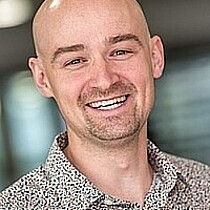

Article: Monday, 11 March 2019
Leadership has always been crucial to the effective functioning of society, and organisational performance depends in large part on the successful management of human capital. Throughout history, leadership has been vital to the fortunes of companies and entire economies alike. Yet today we face an increasingly complex world that requires leaders to deal with what we call “wicked problems” – challenges that have so many variables involved that it’s not possible to solve them with natural-born charisma or talent, say Dr Hannes Leroy, Scientific Director of the Erasmus Centre for Leadership and Dr Verena Ohms, Operational Director of the Erasmus Centre for Leadership in Discovery Magazine 36.
Many people still believe that people are born leaders, but they’re not – they’re made. And to give this rapidly changing world the leaders it needs, we urgently need better leadership development. So how do we get better at producing leaders who are fit for purpose?
The reinvigorated Erasmus Centre for Leadership aims to do just that – contribute to the understanding of effective leadership through fundamental as well as applied research into the field, working with the RSM community internally and with external partners to produce the type of leaders the world today desperately needs.
All facets of education at RSM, whether in the bachelor, master, MBA, or the school’s executive education programmes, have some form of leadership component, and we are working to energise these courses with leadership development. We are also working with external clients – organisations, large and small, profit, non-profit and governmental – to create a home for people who are passionate about leadership: a place to come together to be better leaders.

One example is our Leadership Conversations event that brings prominent academics and working professionals together to debate the big leadership challenges of the day, create effective solutions, share best practice, and enjoy what is also an excellent networking opportunity. The next event is on 10 May 2019 and we invite all who are passionate about leadership to attend.
At RSM, we house more leadership experts per square metre than any other leading business school and use state-of-the-art management science facilities. We know what works and what doesn’t work in the realms of leadership and leadership development. These points are made because it seems like every five minutes there is a new leadership book published, and pretty much anyone can call themselves a leadership developer. From horoscopes to “feel good” workshops, strange concepts, perspectives and tools are being used in the name of leadership development often without any scientific proof that they are beneficial. That’s why we’ve launched a leadership podcast that, similar to the popular MythBusters TV show, takes a critical approach to debunking unfounded leadership theories and myths.
One such myth relates to authenticity in leadership. Bill George, who pioneered the concept in his best-selling 2003 book, defined authentic leaders as those of the highest integrity, with a deep sense of purpose and who recognise the importance of their service to society. The idea was to hone a new generation of leaders who can learn from leadership failures that led to the corporate scandals, such as Enron’s. George’s research has shown that authentic leaders are more willing to grow and learn; and that by taking on new challenges, they become more effective.
However, many self-proclaimed leadership experts have taken George’s message out of context and fail to acknowledge that authentic leadership comes with downsides. For example, we know from various studies that feeling “authentic” is negatively correlated to being perceived as authentic. In other words, if you say you’re authentic, people tend to view you as the opposite. That can lead to you not getting the promotion you want, or a bonus, or even marital problems – you name it. The reason people love going to authenticity workshops is that it gives their self-esteem and ego a boost. But research suggests the approach has dangers, and our podcast series will bust this and many more leadership myths.
This is one of many examples of our hands-on approach to leadership development. Research is of no use if it has no practical application in business and management, and this is of paramount importance to us. We will be conducting field research in collaboration with a variety of organisations from the worlds of academia and business, and developing experimental research in carefully controlled laboratory environments. We hope to demonstrate the value of our school’s research not only through citations in top academic journals, but also by showcasing its practical value and impact in the real world of business.
One example of this is our Superhuman Balance Track. Leadership has always been demanding, but the pressure on managers now is extraordinary, and it doesn’t just stem from their work but their private lives, too. Leaders today are required to be superhumans and the pressures can lead to burnout, depression or unhealthy lifestyles. We want to help leaders optimise their health, both physically and psychologically, so they are able to cope with the pressures and perform well amid this increasing complexity. To that end, our Superhuman Balance Track helps leaders understand how to cope with these pressures. For example, we teach leaders what science tells us about important issues connected to health and well-being, such as the optimal hours of sleep, diet, etc. We want to help leaders bring their best self forward – to run a marathon, not just one short sprint. We’re even developing an instrument that, based on heart rate variability, will send a message to the user’s smartphone to alert them if their stress levels spike out of control. Our leadership development goes way beyond simple communication.
As another example, we take EMBA, MBA and executive education students on an expedition to Norway. They spend up to 12 hours a day walking through snowstorms of up to 100km per hour. In the face of all of that, their true leadership characteristics come to the forefront. This fits in with our core principle of leadership development, which is: “uncomfortable, but learning.”
These are just some of many ways we engage with and help individuals to become real leaders, and we call upon all students and professionals who are passionate about leadership to get involved and work with us on furthering leadership development.
Rotterdam School of Management (RSM)

This article was published in RSM Discovery Magazine 36

RSM offers Executive Education and Master programmes in various business areas for any stage of your career. For instance:

Science Communication and Media Officer
Rotterdam School of Management, Erasmus University (RSM) is one of Europe’s top-ranked business schools. RSM provides ground-breaking research and education furthering excellence in all aspects of management and is based in the international port city of Rotterdam – a vital nexus of business, logistics and trade. RSM’s primary focus is on developing business leaders with international careers who can become a force for positive change by carrying their innovative mindset into a sustainable future. Our first-class range of bachelor, master, MBA, PhD and executive programmes encourage them to become to become critical, creative, caring and collaborative thinkers and doers. www.rsm.nl
For more information about RSM or this article, please contact Danielle Baan, Media Officer for RSM, via +31 10 408 2028 or baan@rsm.nl.
